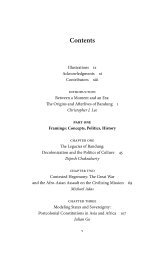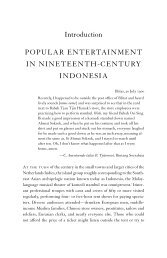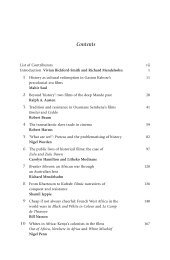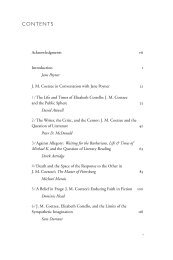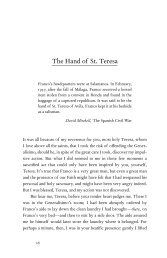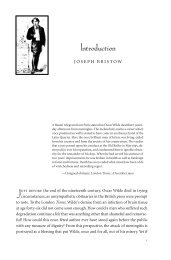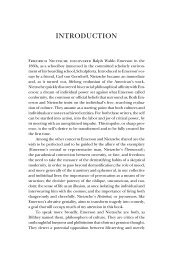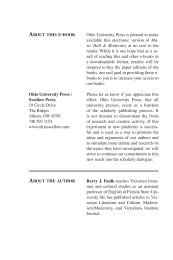Race, Revolution, and the Struggle for Human Rights in Zanzibar ...
Race, Revolution, and the Struggle for Human Rights in Zanzibar ...
Race, Revolution, and the Struggle for Human Rights in Zanzibar ...
Create successful ePaper yourself
Turn your PDF publications into a flip-book with our unique Google optimized e-Paper software.
makes isl<strong>and</strong>ers a unique people, possess<strong>in</strong>g a set of <strong>in</strong>terests that ought<br />
to be defended with<strong>in</strong> <strong>the</strong> Tanzanian union. In <strong>the</strong>ir ef<strong>for</strong>ts to rally isl<strong>and</strong>ers<br />
of all backgrounds aga<strong>in</strong>st <strong>the</strong> rul<strong>in</strong>g party, <strong>the</strong>y employ a language<br />
of human rights that has atta<strong>in</strong>ed a global currency as widespread as that<br />
of socialism <strong>and</strong> of African nationalism <strong>in</strong> <strong>the</strong> 1960s. Thus, not only do<br />
<strong>Zanzibar</strong>is contest <strong>the</strong> legacy of <strong>the</strong> revolution <strong>in</strong> <strong>the</strong>ir lives, <strong>the</strong>y also<br />
disagree on <strong>the</strong> language through which it is to be understood.<br />
The two memoirs conta<strong>in</strong>ed <strong>in</strong> this volume may be read as oppos<strong>in</strong>g<br />
arguments <strong>for</strong> <strong>and</strong> aga<strong>in</strong>st <strong>the</strong> revolution; as such, <strong>the</strong>y provide rare <strong>and</strong><br />
contradictory <strong>in</strong>sights <strong>in</strong>to Tanzania’s postcolonial history <strong>and</strong> current<br />
political stalemate. They demonstrate how conflicts with<strong>in</strong> <strong>Zanzibar</strong><br />
have become issues of national importance <strong>for</strong> Tanzania. The memoirs<br />
also demonstrate <strong>the</strong> differences between <strong>the</strong> language of socialism <strong>and</strong><br />
that of human rights. Ali Sultan Issa supports <strong>the</strong> revolution on socialist<br />
pr<strong>in</strong>ciple as an event that liberated isl<strong>and</strong>ers from a colonial system of class<br />
exploitation. Seif Sharif Hamad, however, regards <strong>the</strong> revolution as a disaster<br />
<strong>in</strong> terms of human rights, an event to be regretted deeply. While<br />
each man served <strong>for</strong> years as a m<strong>in</strong>ister <strong>in</strong> <strong>the</strong> revolutionary regime, each<br />
was also imprisoned <strong>and</strong> <strong>for</strong>ced out of <strong>the</strong> rul<strong>in</strong>g party. Nei<strong>the</strong>r espouses<br />
African nationalism nor advocates <strong>the</strong> politics of race. Each, <strong>in</strong> fact,<br />
specifically deplores <strong>the</strong> habit of some <strong>Zanzibar</strong>i politicians to manipulate<br />
racial or ethnic identities <strong>in</strong> order to achieve political ends. They<br />
both, fur<strong>the</strong>rmore, dispute official claims made <strong>for</strong> decades <strong>in</strong> <strong>the</strong> schools,<br />
<strong>in</strong> <strong>the</strong> media, <strong>and</strong> at public rallies that, s<strong>in</strong>ce 1964, <strong>the</strong> isl<strong>and</strong>s have seen<br />
rapid social <strong>and</strong> economic development.<br />
Official claims that reflect African nationalist currents of thought<br />
should be understood <strong>in</strong> order to grasp <strong>the</strong> historical <strong>and</strong> <strong>in</strong>tellectual<br />
context of <strong>the</strong> memoirs presented here. Salm<strong>in</strong> Amour, who served as<br />
president of <strong>Zanzibar</strong> (1990–2000), completed his doctoral dissertation<br />
at Karl Marx Party College <strong>in</strong> East Berl<strong>in</strong> <strong>in</strong> 1986. “<strong>Zanzibar</strong> <strong>in</strong> <strong>the</strong> earliest<br />
days,” he writes, was “a totally classless society.” Un<strong>for</strong>tunately, it was<br />
not “left to prosper smoothly over time.” 1 Arabs came <strong>and</strong> <strong>in</strong>troduced<br />
slavery, someth<strong>in</strong>g Amour claims was until <strong>the</strong>n completely unknown,<br />
ignor<strong>in</strong>g considerable historical evidence to <strong>the</strong> contrary. 2 Arabs denied<br />
Africans <strong>the</strong> chance to evolve <strong>the</strong>ir own <strong>for</strong>ms of socialism: had Africans<br />
“been left to follow <strong>the</strong>ir life styles smoothly,” <strong>the</strong>y would have developed<br />
“<strong>in</strong>to a higher <strong>for</strong>m of <strong>the</strong> African collective mode of liv<strong>in</strong>g.” 3 Africans<br />
possessed no desires to exploit one ano<strong>the</strong>r, <strong>and</strong> it was only <strong>the</strong> <strong>in</strong>filtration<br />
of <strong>for</strong>eigners that produced “evils” such as class divisions <strong>in</strong> <strong>the</strong> isl<strong>and</strong>s. 4<br />
Amour’s portrayal of precolonial society <strong>in</strong> <strong>Zanzibar</strong> as protosocialist<br />
<strong>and</strong> egalitarian is familiar; it reflects <strong>the</strong> <strong>in</strong>tellectual <strong>in</strong>fluence of Julius<br />
Cosmopolitanism <strong>and</strong> Its Discontents 3



